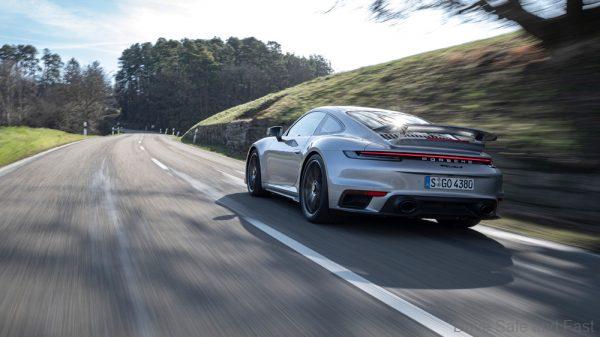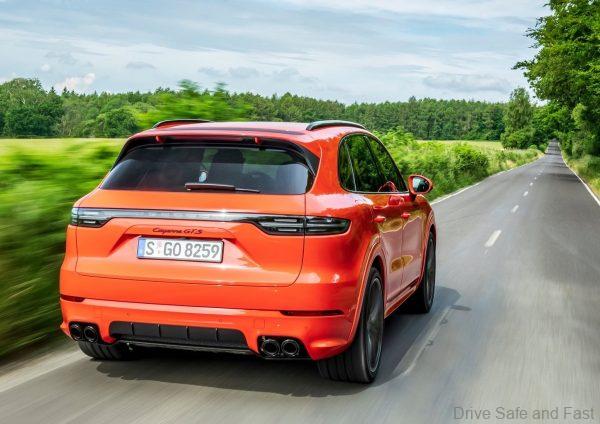Porsche management is celebrating their sales success whilst many other car manufacturers are struggling to keep their factories open. This is the reality of an economic downturn. The rich around the world will still continue to enjoy their money whilst the many middle class and lower middle class will soon not be able to keep their homes and their sanity.
In every economic downturn, luxury motoring keeps enjoying brisk sales as many benefit from an economic downturn and there are some others who cannot be affected by global issues.

Recently when Porsche in Malaysia launched the latest 718 Cayman GT4 and Spyder to the media, we were informed that the first batch of cars were already sold out before the even arrived in the showroom. Priced from RM970,000 these sports cars had Malaysian owners whilst we were being introduced to them.
Now comes news that Porsche in Germany has just reported a healthy first six months sales figure.
After a challenging first half of 2020, Porsche AG achieved a return on sales of 9.9 per cent. The sales revenue of 12.42 billion euros is 7.3 per cent down on the previous year; the return on sales of 1.23 billion euros fell by 26.3 per cent compared to 2019.
The good performance compared to the competition is based on an extensive programme to improve the break-even point as well as the successful new Porsche products.

“The current situation has been challenging for our company. We are managing the coronavirus crisis responsibly and systematically, and at the same time see it as an opportunity. We have been given a boost by our attractive new products, from the 911 Turbo to the Taycan electric sports car, which was recently voted the world’s most innovative car,” says Oliver Blume, Chairman of the Executive Board at Porsche AG. “We stand for visions and set new standards. This pioneering spirit is what drives us,” says Blume. “We will invest 15 billion euros over the next five years in new technologies alone.”
“We stand for visions and set new standards. This pioneering spirit is what drives us.” Oliver Blume.
“When it comes to investment in electromobility and digitalisation, we are still in the fast lane,” confirms Lutz Meschke, Deputy Chairman and Member of the Executive Board responsible for Finance and IT at Porsche AG. “At the same time, we are continuing to pursue our ambitious strategic targets for the return on sales so that we can safeguard jobs at Porsche in the long term.” That is why the CFO says that Porsche will take further measures to increase efficiency. “Tremendous joint efforts are required in order to secure jobs,” says Meschke.

Deliveries: Strong positioning worldwide
Deliveries in the first six months of 2020 fell globally by 12.4 per cent in total to 116,964 vehicles. Despite Porsche Centres remaining closed for several weeks, 4,480 units of the new Taycan were delivered. The iconic 911 also achieved growth of 2.2 per cent, with 16,919 deliveries. The Cayenne was the most popular model with a total of 39,245 deliveries, while 34,430 units of the Macan were handed over to customers. China remained the largest single market by volume for the sports car manufacturer in the first half of 2020 with 39,603 deliveries. 32,312 cars were supplied to European customers. In the US, Porsche delivered 24,186 cars between January and June.
Cayenne GTS, 2020, Porsche AG
The Cayenne was the most popular model with a total of 39,245 deliveries.

Optimistic outlook
“The coronavirus crisis has also not left Porsche unscathed,” says Meschke. “In Europe and the USA, we suffered a significant downturn in the first half of 2020. In China and other Asian markets like Korea and Japan, things have already been running well again for some weeks,” says Meschke. It is still too soon to make a forecast for the rest of the year. “We are optimistic that we will be able to offset some of the losses from March, April and May. Of course, this will only be possible if there are no more setbacks due to coronavirus,” explains Meschke. In 2020, the year of coronavirus, Porsche is abandoning its strategic target of a 15 percent return on sales. “But we are making every effort,” says Meschke, “to also achieve a double-digit return on sales in 2020.”
Sustainability: Porsche takes responsibility
Porsche is pursuing its ambitious sustainability objectives more forcefully than ever before – with an integrated approach across economic, environmental and social dimensions. “At Porsche, commercial success and social responsibility go hand in hand,” says Blume. “It is particularly important to us during the coronavirus crisis to play an active role in society and to take on responsibility. Helping others is an integral part of the Porsche culture,” says the Chairman of the Executive Board. That is why Porsche has considerably expanded its social activities at its national and international sites. The “Porsche helps” programme supports public crisis task forces, aid organisations, hospitals, and people in need through various initiatives.



